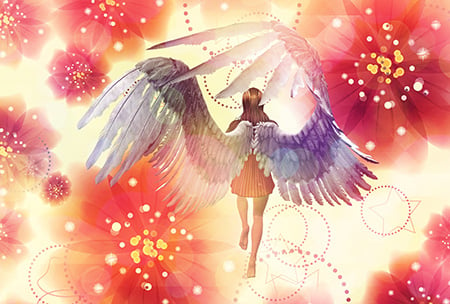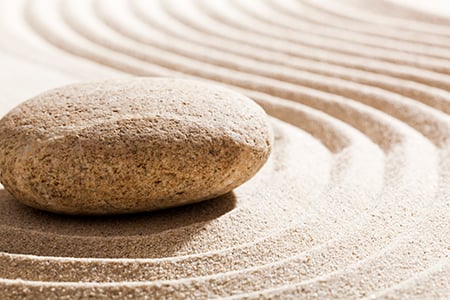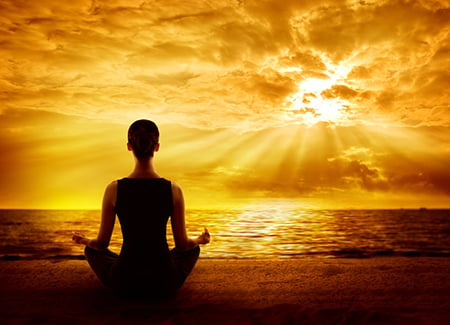Waiting As Spiritual Practice
In our resentment of waiting, we have forgotten it has a natural place in the cycle of life.
Every time I read my kids Oh the Places You’ll Go! by Dr. Seuss we wind up on that striking page partway through — the page that is not a page, but a place — The Waiting Place. We’ve all been there in our lives too. And for that, it always makes me chuckle inside — the aptness and relatability of waiting as something that we are sometimes stuck in. It can feel, as the book frames it, useless.
And it is true that living within capitalism, waiting, and particularly choosing to wait, is seen as useless; a waste of time; a denial of your true potential to be and do and create great things. In short, waiting is unproductive. Yet, on The Waiting Place page there are illustrations of people doing things that people do specifically and intentionally to slow down and wait — like fishing, smoking, or meditating.
Waiting in line, as one example of waiting, is a plight of the modern human living in industrial capitalism, and I myself often feel stuck in and beholden to that system. In spite of that or perhaps because of it, I have challenged myself to embrace a different relationship with waiting. I see it as medicine for our modern, technology-driven lives, which have us stimulated and scheduled in every waking moment. I see it not as useless, but rather as an invitation to reconnect with a forgotten art, and in turn to nourish a part of our soul and our psyche that is parched.
It is the very system that traps us waiting in useless ways that has framed waiting as a useless art. And it is this framing of waiting as useless, and this framing only, that has led us to resent waiting.
In our resentment we have forgotten that waiting has a natural place in the cycle of life. Waiting is a primary stage in the creative cycle — all organic life depends on a period of fallow — for nourishment, for incubation, for germination. Only machines can exist without a pause, and even then, there are still necessary pauses, since they are created and tended by humans. Waiting is what we do during pauses, during periods of descent, periods of quiet, and periods of rest; they are natural and nourishing.
Pauses give us time for psychic and spiritual reflection and they give our nervous systems time to remember that we are safe.
In our busy lives, recognizing an invitation for a pause and taking it, often has to be an intentional choice. It has become all too easy to fill in the spaces of what used to be endless invitations to take a pause. For example, before the advent of electricity, darkness set a boundary that we had to take a pause; it provided a daily invitation to slow down, rest, and fortify ourselves for the following day.
To varying degrees depending on your proximity to the equator, the year sets this tone for us with the shorter days of winter. But with electricity and cars and hand held devices, we rarely have to stop unless we choose to. With nature’s cycles less and less of an imposition, we are left making these boundaries for ourselves.
Invoking The Medicine Of Waiting
One way I’ve been offering myself a taste of the medicine of waiting is in my relationship with preparing and arriving to places, appointments, or events. For most of my life I have been a person who is pretty much right on time, maybe a few minutes early or late, but just about right on time. In the past 3-5-years I’ve been urging myself to switch up this pattern by arriving early. I have a friend who says, “Being on time means being early.”
I think of this often and am experimenting with it. I have noticed that I am calmer and more relaxed when I leave early. I think about time itself less because I am not preoccupied or worried about being on time, and therefore there is more space for me to be myself. I no longer have to compartmentalize the part of me that likes to wonder or feel the freedom of not thinking about time. I can stop at a free pile on the side of the road without rushing. I can use the bathroom before the appointment and still be ready when it begins.
Giving myself enough time opens up psychic and spiritual space. Released from the preoccupation of time, my mind is free.
Making time to wait or making a conscious choice to be still in mind and body instead of filling your time with your phone or other distractions, is a spiritual practice. It is an act of decolonizing from the expectations that we must always be busy, productive, and occupied to be of value, and it gives us space to be ourselves.
This can at times be uncomfortable; we may feel bored, we may judge ourselves as useless, we may be distracted by how many texts we have to respond to. But, we may also remind ourselves that laying fallow is nourishing, and that nourishment is in fact productive — perhaps the most productive, when we give ourselves the chance to experience it.
Waiting is a healthy and natural part of the creative cycle and of our lives, an antidote to the expectations and assumptions of our value and worth in capitalism, and an invitation to reclaim our relationship with time. Waiting is a spiritual practice.
There Is Another Type Of Waiting As Spiritual Practice…
Waiting when you don’t know what you are waiting for. It is one thing when you are waiting for your turn to use the bathroom, and you know it will come even if you don’t know when. In that case, you are waiting because of the promise of a thing.
But when you don’t know what we are waiting for and you choose to wait anyway, you are squarely in trust and faith.
Sometimes in life we find ourselves in a place where what we had been doing, or what we had wanted, or the way things are going are no longer what we want or need. Either they don’t work out as we expected or they worked out just as we had hoped but they are in fact not what makes us happy — or lots of scenarios in between. There are times when the alternative is clear and we can go for it, and there are many, many times when it is not and we are not quite sure what is next.
In this case, if we open ourselves to not being sure, we are embracing a life pause — we are embracing a natural part of the creative process of our lives. We may know we are waiting to see where life leads us and how things unfold, but we are choosing not to be in control. We are allowing ourselves to not know what is next.
Embracing waiting in small moments in your everyday life serves as a teacher, priming you to see opportunities for larger life stage pauses when they present themselves.
Back to Dr. Seuss, The Waiting Place is seen as a useless and unproductive place — waiting represents life having control over you rather than you taking initiative and control over your life. Non-action represents failure in our culture.
Waiting as a spiritual practice means that sometimes you make a conscious choice to wait. It does not mean that you have lost control, that you are unempowered or incapable. It means you are consciously leading your life to make room for a pause. You are allowing yourself to wait. You are leaning into trust and faith.
On the page after The Waiting Place it says, “Somehow you’ll escape.”
When we embrace waiting as our spiritual practice, it is not something we need to escape, but fertile soil for our creativity, our imaginations, our souls and spirits to revitalize themselves, to nourish themselves — a place where we connect with self and bolster ourselves to then connect with others and give back to the world from a place of authenticity. It is a place where we reposition the authority of our lives as our belonging to ourselves, and then take action and initiation from there, rather than skipping the reflective pause and blindly moving forward because we think we should or we can’t stand to not know.
Embracing waiting in small moments in your everyday life serves as a teacher, priming you to see opportunities for larger life stage pauses when they present themselves. It helps us build comfort in the unknown, because every time we settle into a pause, we make space to find our inner authority, and we learn to trust ourselves.
It also helps us support others in our lives who may be struggling with the unknown and feel pressure to “escape” their situation. There are times when action is the right medicine, and there are times when waiting is the right medicine, and there are times when they can exist harmoniously, side by side.
This article is a repost from Brittany’s substack newsletter; you can sign up for her substack at BrittanyWoodNickerson.substack.com.
Brittany Wood Nickerson is a writer, astrologer, herbalist, and interspiritual minister. You can learn more about her work and offerings at ThymeHerbal.com.
Find holistic Yoga Practitioners in the Spirit of Change online Alternative Health Directory.
RELATED ARTICLES:
How Letting Your Mind Wander Can Reset Your Brain
Meditation Is More Than Silence and Emptiness












